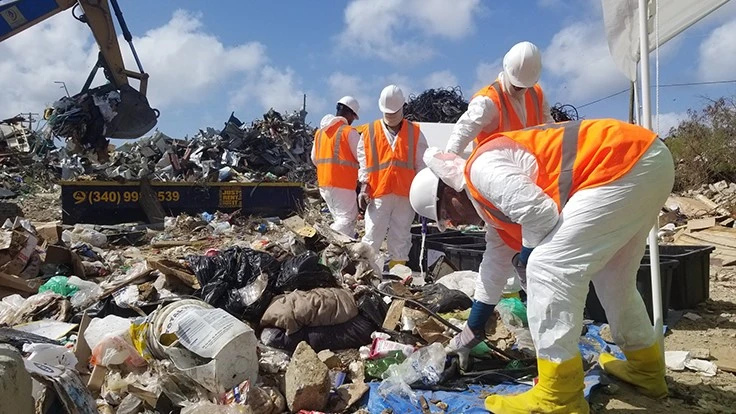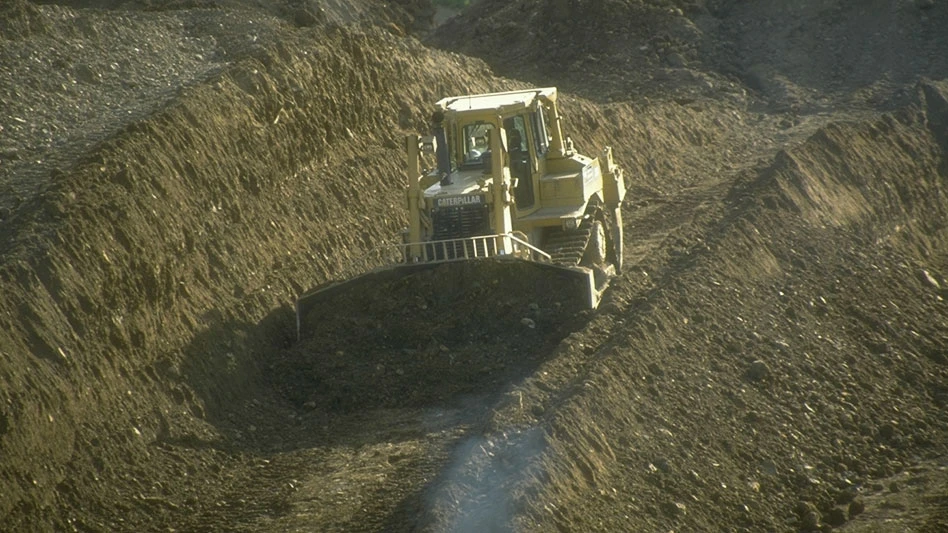
Courtesy of EPA
As part of their continuing efforts to help the Caribbean recover from the long-term impacts from Hurricanes Irma and Maria, the U.S. Environmental Protection Agency (EPA), the Federal Emergency Management Agency (FEMA) and the University of the Virgin Islands (UVI) announced they are collaborating to complete a municipal solid waste characterization study at the landfills in the U.S. Virgin Islands. The study is supported through federal grants and contracts to assist the U.S. Virgin Islands Department of Planning and Natural Resources (VIDPNR) and the U.S. Virgin Islands Waste Management Authority (VIWMA) to solve landfill capacity overflow.
“The U.S. Virgin Islands was already facing a waste management crisis when Hurricanes Irma and Maria struck the islands, worsening the problem,” says EPA Regional Administrator Pete Lopez. “Working with our federal, territory and education partners, this study will help create environmentally and economically sustainable long-term waste management strategies, including waste reduction and recycling programs.”
“This collaborative study will benefit our whole community, and it is imperative that we individually do our part to improve the environment,” says Jacqueline Heyliger, FEMA’s U.S. Virgin Islands recovery director. “By reducing and repurposing the waste in our landfills, we will achieve economic growth while ultimately improving human health and the health of our environment. We work best when we work together.”
“This combined effort between VI Waste Management, EPA and UVI will provide us with a useful snapshot of the waste stream in the territory,” says Greg Guannel, the director of the Caribbean Green Technology Center at UVI. “Results will be extremely informative for planning strategies to increase opportunities for recycling and composting and make our islands even more beautiful.”
A solid waste characterization study allows the government to understand the composition of materials discarded in the waste stream. Waste characterization data is collected by taking samples of waste and sorting it into material types, including recyclable items such as newspapers, cardboard, plastic bottles, glass bottles and jars, tin cans and small appliances. Over a four-day period, EPA and UVI will characterize waste from all three U.S. Virgin Islands at the Bovoni landfill on St. Thomas and the Anguilla landfill on St. Croix. The study is an update to the 2009 waste characterization study on St. Thomas.
The Bovoni and Anguilla landfills are rapidly nearing maximum capacity and were ordered to either close or to come into compliance to meet federal requirements for landfills by 2022. To properly plan for future short-term and long-term solid waste management solutions, information gathered in a municipal waste characterization study about the current waste generation is required. The information will help determine the size of new landfills, what materials could be diverted from landfilling, if waste-to-energy is an option for the islands, and how much recyclable material is being landfilled and if it would be economically beneficial to recycle it.
This study is the first step in developing and updating waste management programs and evaluating ways to reduce and manage waste and cut disposal costs. In addition to helping create an integrated waste management program, the data collected will inform the government of the U.S. Virgin Islands in its efforts to craft recycling policies.
Latest from Waste Today
- Anaergia Services enters into contract with Rialto Bioenergy Solutions
- Casella announces offering of revenue bonds
- New Hampshire pauses proposed landfill rules
- Waste Connections, Food Science Corp. partner with Texas city to recycle food waste
- Waga Energy signs partnership agreement with technology provider
- AMCS launches the AMCS Platform Winter 2024
- Pettibone adds new model to telehandler line
- Waste Pro near top of Florida private companies list





